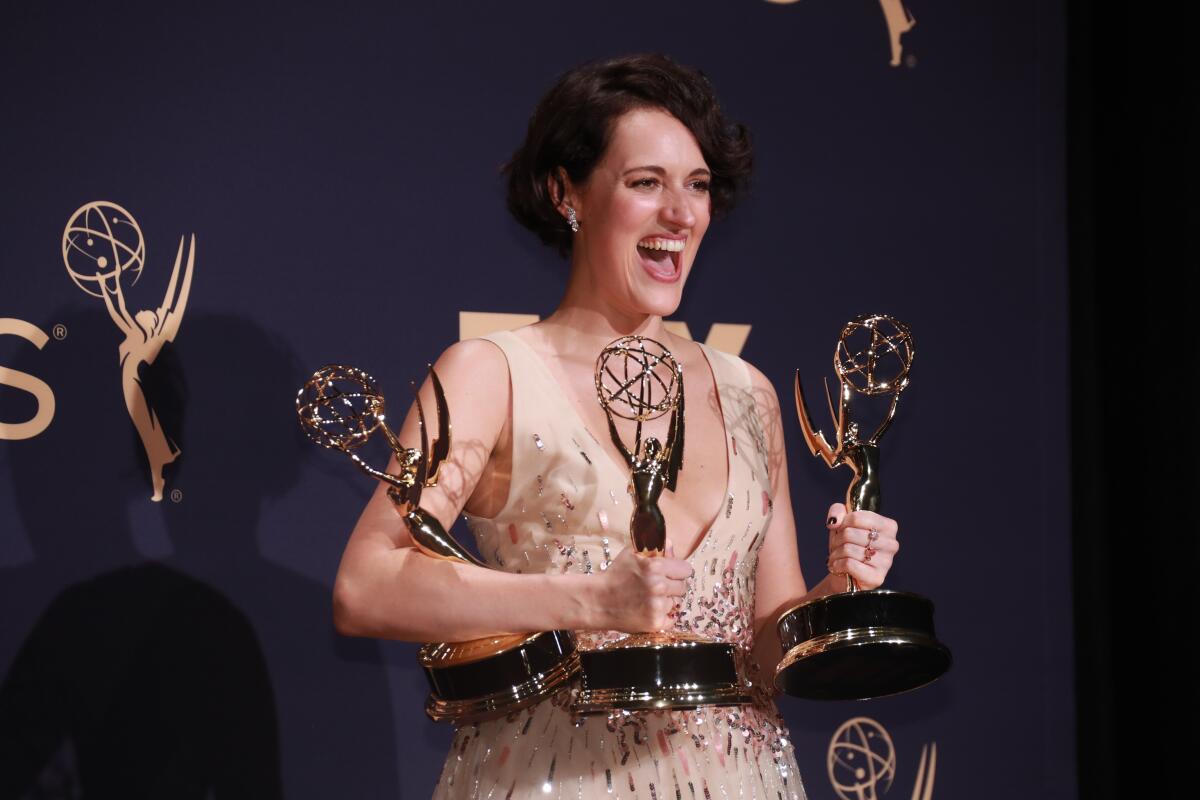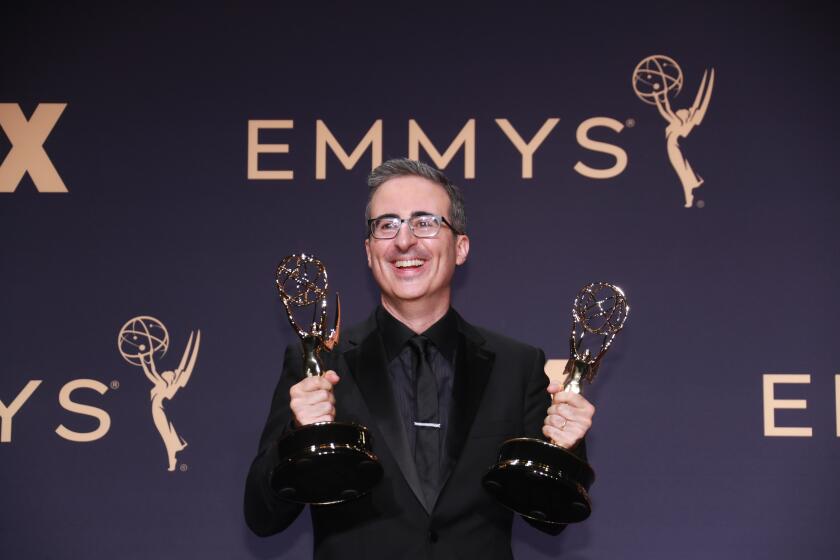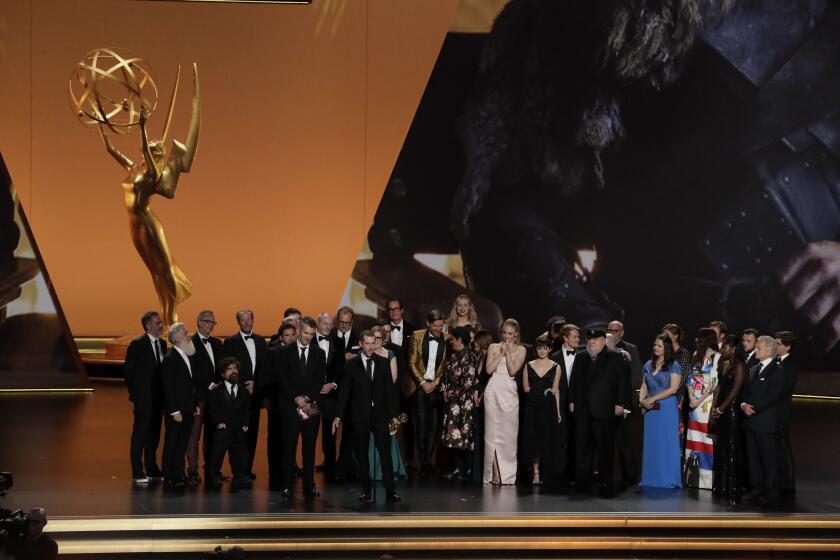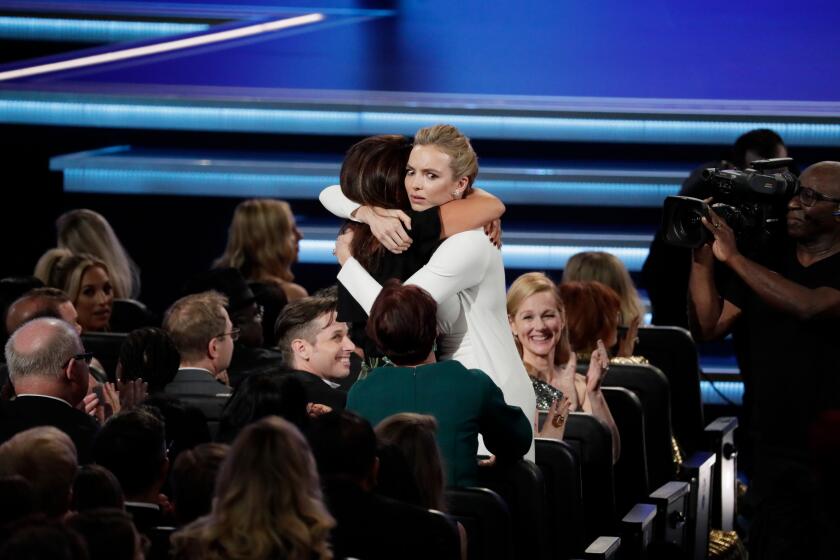‘Fleabag.’ ‘Succession.’ ‘Pose.’ How the Emmys finally harnessed the power of ‘peak TV’

From a dominant night for Phoebe Waller-Bridge’s “Fleabag” to historic wins by Billy Porter and Jharrel Jerome, daring television prevailed at the 2019 Emmys.
- Share via
Peak TV. Prestige programming. The platinum age of television.
Whatever we chose to call the tsunami of innovative series that have made watching too much television a respectable pastime, the Television Academy finally managed to wrap its arms around the multiplatform beast on Sunday during their 71st Primetime Emmy Awards ceremony in Los Angeles.
From “Game of Thrones” to “Fleabag,” “Chernobyl” to “Ozark,” “Killing Eve” to “Pose,” the winners list produced during the three-hour Fox telecast was a testament to the diversity — in budget, subject matter, character and platform — that’s changed the very definition of television.
In the battle among networks and streaming services for Emmys 2019 supremacy, HBO came out on top, nabbing nine victories at Sunday’s ceremony.
Case in point: Phoebe Waller-Bridge’s comedy “Fleabag,” about a woman’s dysfunctional relationship with her family, men and, yes, relationships. “This is getting ridiculous,” she said, somewhat stunned as she accepted the show’s fourth and biggest award of the night for comedy series.

In a huge upset, the cutting-edge artist also won the lead comedy actress Emmy over former favorite Julia Louis-Dreyfus of HBO’s powerhouse “Veep” and last year’s victor, the beloved Rachel Brosnahan of Amazon’s “The Marvelous Mrs. Maisel.” Waller-Bridge also took home the prize for writing for a comedy series over strong competitors such as HBO’s “Barry.”
As television hurtles forward into what looks like another new phase of its endless new phases — get ready for streaming platforms Disney+, Apple TV+ and more to upend the game — it’s important to stop and savor the moment we’re in now. Sunday’s Emmys were the culmination of a creative renaissance that’s still so fast-moving we haven’t had the time to give it a name that sticks. But it’s made it so “Fleabag” and “Game of Thrones” occupy the same space, at least when it comes to industry respect and (respective) social media fervor.
Even Hollywood veteran Michael Douglas, who lost the comedy actor honor for his work in Netflix’s “The Kominsky Method” to “Barry’s” Bill Hader, appeared impressed by the sheer breadth of the material represented onstage Sunday.
When introducing the drama series award he described the nominees — “Better Call Saul,” “Bodyguard,” “Game of Thrones,” “Killing Eve,” “Ozark,” “Pose,” “Succession” and “This Is Us” — as “each being so different from the television we grew up on.”
It was not surprising that the night’s top honor went to “Game of Thrones.” What was unexpected? The last big water-cooler series didn’t sweep every drama category possible for its final, earth-scorching season.
Still, the ceremony was less about dancing on the graves of blockbusters such as “Game of Thrones” or “Veep,” which was also expected to win big in the comedy categories but came away empty-handed. It was more about celebrating the wide-open landscape that allowed for “Killing Eve” and “Pose” to even happen, and then for their leads — Jodie Comer and Billy Porter — to win the academy’s top drama honors.

The night belonged to high-budget productions as well as fringe efforts, familiar faces doing new things — including Jason Bateman, who won for his direction in “Ozark”— and new arrivals that have bent comedy and drama norms into pop art.
The ceremony itself was as loose and far-flung as the industry it was honoring. It was the first time the show went host-less since way back in 2003 when the big four networks still won all the top awards, and it would be another year before HBO’s “The Sopranos” took home cable’s first drama series Emmy.
The show was held together by a pastiche of personalities and TV ephemera that included Homer Simpson, masked singers and a tuxedo-clad Bryan Cranston introducing a year in television that looked markedly different than it did when “Breaking Bad” arrived over a decade ago.
Keep tabs on all the winners at the 71st Primetime Emmys with our live-updating list.
“Television has never been bigger,” he said. “Television has never mattered more. And television has never been this damn good.”
Emotions ran high when Jharrel Jerome accepted the award for lead actor in a limited series for his performance in Ava DuVernay’s “When They See Us.” The series followed the saga of black teens dubbed the Central Park Five by the media, who were wrongly accused and imprisoned for the brutal rape of a Central Park jogger.
Jerome, who played one of the accused, Korey Wise, in the series, dedicated the award to “the men that we know as the Exonerated Five.”
And all five men — Wise, Kevin Richardson, Antron McCray, Raymond Santana Jr. and Yusef Salaam — were in the audience, on their feet, hands in the air as if they’d been freed once again.
The Emmys went off script this year with delightful, shocking wins for “Fleabag,” Phoebe Waller-Bridge and Jodie Comer.
“Game of Thrones” star Peter Dinklage might have put it best when he accepted the Emmy for supporting actor in a drama. “Thank you. I have no idea what I’m about to say, but here we go. I count myself so fortunate to be a member of a community that is all about tolerance and diversity, because in no other place could I be standing on a stage like this,” he said, choking up.
Porter, who plays bawdy ballroom emcee Pray Tell in Ryan Murphy’s “Pose,” told the audience, “James Baldwin said, ‘Took many years of vomiting up all the filth that I had been taught about myself, and halfway believed, before I could walk around this earth like I had the right to be here,’” and then added, “I have the right, you have the right, we all have the right!”
Sunday’s ceremony was proof of how far television has come creatively, socially and as an industry. And if we’re to read anything else into the 71st Emmys, it’s that there’s plenty more change to come.
More to Read
The complete guide to home viewing
Get Screen Gab for everything about the TV shows and streaming movies everyone’s talking about.
You may occasionally receive promotional content from the Los Angeles Times.
















